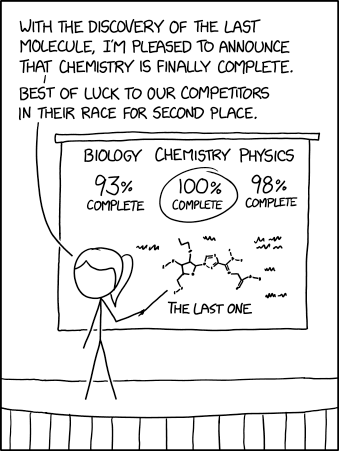2552: The Last Molecule
| The Last Molecule |
 Title text: Biology is really struggling; they're barely at 93% and they keep finding more ants. |
Explanation
| |
This explanation may be incomplete or incorrect: Created by a CONFUSED PARTIAL BIOCHEMIST - Please change this comment when editing this page. Do NOT delete this tag too soon. If you can address this issue, please edit the page! Thanks. |
This comic jokingly proposes a situation in which chemists have discovered and catalogued every single possible molecule. Thus they declare they have "completed chemistry."
In real life the number of ways to arrange atoms into molecules is growing combinatorial with the number of atoms in a molecule. Hence the number of possible combinations approaches rather quickly the number of particles in the observable universe making the full cataloging of all molecules impossible. Thus, a "final molecule" cannot be reached. In addition, chemistry is the study of the interaction and changing states of atoms and molecules, not simply the cataloging of all specimens of molecule. Even if we had a list of every molecule, there are a far greater number of ways to continue studying them, so the field would still be nowhere near completed. To quote the famous chemistry researcher, educator, businessman and philanthropist Walter White, "Chemistry is the study of change".
This is reminiscent of biology's focus in previous centuries on simply cataloging the species on Earth.
Further, the goal of science is not to "complete" a field, but to understand it better and better. No scientific field is considered fully understood.
Putting Biology at 93% and Physics at 98% is patently absurd. As mentioned in the comic, we don't even know how many kinds of ants there are yet. When J.B.S Haldane, founder of the field of population genetics, was asked what could be inferred about the creator from the creation, he reportedly said, "He has an inordinate fondness for beetles". Insects aside, fundamental and important problems such as what genes promote which traits, the nature of cognition, and the mechanism behind several diseases remain complete mysteries. We know less about our own ocean floor than we do about the surface of Mars. Needless to say, Biology is nowhere close to 93% solved. As for Physics, questions such as "what the actual hell is dark matter?" and "how do we unify the four fundamental forces?" and "how do we make nuclear fusion possible on earth?" and "how fast does light travel in one direction?" make it clear that the field still has a long, long way to go.
